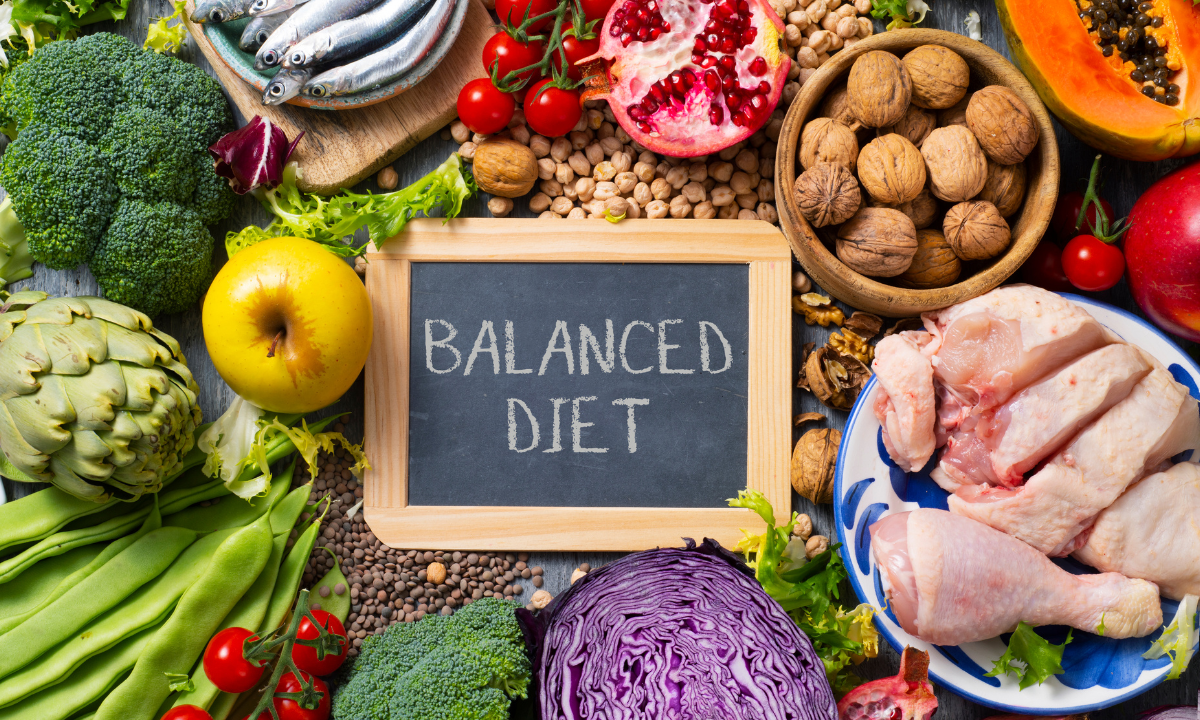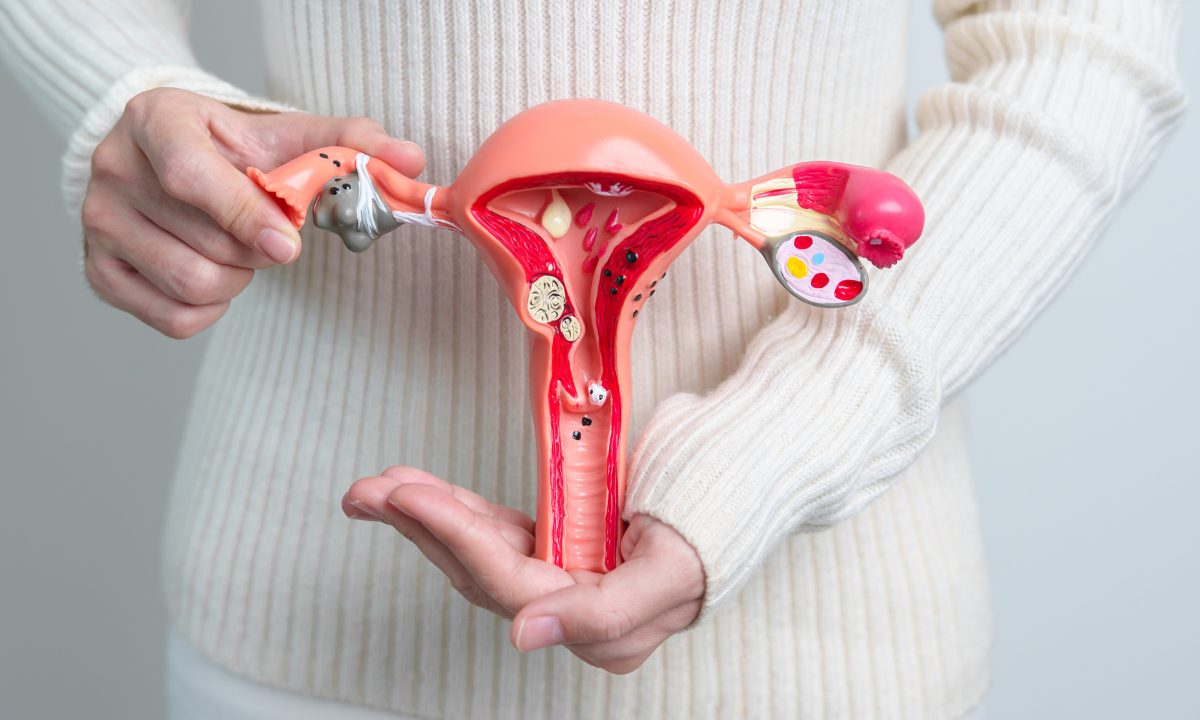Ovarian cancer can grow slowly and not show many visible indicators until it is advanced. There is no food that can cure ovarian cancer, but eating a healthy, balanced diet can help your body get better and improve your quality of life.
Eating correctly can help keep your ovaries healthy, and knowing what to eat and what to avoid will support your general health and may help your body handle therapy better if you need it.
How does eating affect ovarian cancer?
Eating well is key for remaining healthy, but it becomes even more important when you have a serious illness like ovarian cancer. A balanced diet can:
Control your weight:
Being underweight or overweight can influence how your body responds to treatment.
Reduce inflammation:
Long-term inflammation can make diseases worse and increase treatment side effects.
Support your immune system:
A strong immune system can help your body repair and cope with the side effects of treatment.
Maintain your energy:
Keeping your energy up helps manage fatigue following chemotherapy or surgery.
It's important to know that no one food can cure ovarian cancer. Receiving medical care, such as surgery, chemotherapy, immunotherapy, or targeted therapies, is very crucial. Eating well is a good way to stay strong and healthy while undergoing treatment.
Foods to cure ovarian cancer: What to eat for recovery and support

While no foods can cure ovarian cancer by themselves, eating a nutritious, balanced diet can help your body recover from treatment and maintain overall health. Certain foods support healing, boost your immune system, and provide important nutrients during and after cancer therapy.
Foods high in antioxidants
Antioxidants are chemicals that protect your cells from damage caused by free radicals (unstable molecules that can harm your body). Eating these foods rich in antioxidants can help your body heal and stay healthy:
Blackberries, blueberries, strawberries, and raspberries:
Abundant in vitamin C and other antioxidants
Leafy greens:
Spinach, kale, Swiss chard, and rocket contain many vitamins, minerals, and phytonutrients (plant compounds that support your health).
Almonds, walnuts, and pistachios:
Good sources of healthy fats and vitamin E, which is an antioxidant.
Dark chocolate:
Flavonoids in dark chocolate are good for your heart and fight free radicals.
You can get enough antioxidants by adding these foods to smoothies, salads, or snacks.
Cruciferous vegetables
Cruciferous vegetables are a group of vegetables that include broccoli, cabbage, and Brussels sprouts. They are high in glucosinolates (which may help your liver work better and eliminate toxins) and are also rich in fibre, vitamins, and minerals.
Steaming or lightly roasting these vegetables preserves their nutrients. Eating them raw in salads or slaws can also provide many of their benefits.
Fats with omega-3
Omega-3 fatty acids are healthy fats that your body cannot produce on its own. They help reduce inflammation, which may be beneficial during cancer treatment. Foods rich in omega-3 include:
Fatty fish such as salmon, mackerel, and sardines
Flax seeds and chia seeds
Nuts
Hemp seeds
You can get omega-3s by adding seeds to yoghurt or cereal, blending them into smoothies, or eating fatty fish a few times a week.
Whole grains and fibre
Fibre is the part of plant foods that your body cannot digest. It helps beneficial bacteria in your gut grow and supports digestion. Whole grains also help keep blood sugar levels stable, which is important during chemotherapy. Some of the fibre-rich foods are:
Brown rice and wild rice
Quinoa and barley
Oats
Whole wheat bread and pasta
Eating whole grains instead of refined grains provides more fibre and better nutrition.
Herbs and spices that help with inflammation
Spices and herbs can improve the taste of food and contain compounds that reduce inflammation, which is beneficial for your health. You can include the following herbs and spices in your diet:
Garlic:
Contains allicin, which may support the immune system.
Turmeric:
Contains curcumin, which helps reduce inflammation.
Ginger:
Supports digestion and may relieve nausea caused by chemotherapy.
Cinnamon:
Helps maintain stable blood sugar and reduce inflammation.
You can easily add these spices to soups, stews, teas, or roasted vegetables. While a healthy diet is a powerful tool for supporting your body during cancer treatment, it is not a substitute for medical care.
If you would like expert advice on nutrition during cancer care, arrange a consultation with our specialists. We’re here to help you stay healthy and strong throughout your treatment journey.
Our gynae oncology specialists
Loading...
What foods to avoid during ovarian cancer treatment?
Some foods can slow your recovery or increase inflammation. To support your health, try to limit or avoid the following:
Processed foods:
Fast food, packaged snacks, and ready-made meals contain unhealthy fats, sodium, and preservatives.
Sugary drinks:
Soda, energy drinks, and other sweetened drinks can raise blood sugar and contribute to weight gain.
Alcohol:
Excessive drinking can damage the liver, affect hormone balance, and weaken the immune system.
Highly processed meats:
Sausages, hot dogs, and deli meats can increase inflammation and contain chemicals that reduce treatment effectiveness.
Eating unprocessed or minimally processed foods and reducing sugar and unhealthy fats helps your body cope with treatment and maintain energy.
Managing diets for ovarian cancer

Adding nutrient-rich foods to your diet does not have to be difficult. Small, consistent changes can make a big difference:
Get ready ahead of time:
Prepare healthy meals in advance by chopping vegetables, washing greens, and cooking whole grains.
Batch cooking can help you stick to nutritious choices throughout the week and save time.
Smart snacking:
Keep healthy snacks on hand, such as berries, nuts, yoghurt, or cut-up vegetables.
These options provide vitamins, minerals, fibre, and protein, helping you stay energised between meals.
Add flavour with spices:
Use herbs and spices like garlic, turmeric, ginger, and cinnamon to enhance taste without adding too much sugar, salt, or unhealthy fats.
Many spices also have properties that help reduce inflammation or fight free radicals.
Stay hydrated:
Drink plenty of water, herbal teas, or low-sugar beverages.
Staying hydrated supports digestion and metabolism and can help reduce fatigue.
Eat small, frequent meals:
Instead of large meals that may make you feel overly full or uncomfortable, try eating smaller meals more often.
This can help maintain stable energy levels and improve digestion.
Listen to your body:
Choose foods that are easy to eat, enjoyable, and nourishing.
Adjust your diet based on your hunger, energy levels, and how your body responds.
If you’re unsure where to start or need personalised guidance, schedule an appointment with Thomson Medical today to get a meal plan tailored to your needs.
FAQ
Can eating alone get rid of ovarian cancer?
No. Currently, no meal or supplement can eliminate ovarian cancer. During treatment, certain foods can support the body and improve overall health.
However, medical treatments such as surgery, chemotherapy, targeted therapy, or immunotherapy are still essential. Diet helps by providing more energy, reducing inflammation, and supporting recovery.
What kinds of food are best for patients with ovarian cancer?
If you have ovarian cancer, you should include the following foods in your diet:
Fruits and vegetables high in antioxidants
Cruciferous vegetables
Omega-3s
Whole grains
Anti-inflammatory herbs and spices
These foods protect cells, reduce inflammation, support the immune system, and provide nutrients for healing.
What kinds of food should people with ovarian cancer avoid?
Try to limit processed foods, sugary drinks, excessive alcohol, and heavily processed meats. These can increase inflammation, affect blood sugar, and may interfere with treatment.
It’s okay to enjoy them occasionally, but they shouldn’t be part of your daily diet.
How does diet affect chemotherapy or other cancer treatments?
A healthy diet can help with side effects such as nausea, fatigue, and digestive problems.
Protein-rich foods maintain muscle.
Fibre supports digestion.
Antioxidant-rich foods reduce cellular stress from treatment.
Are supplements a safe alternative to nutrient-rich foods?
Whole foods are usually better because they provide a combination of nutrients, fibre, and antioxidants that work together. Some supplements may help, but always consult your doctor first, as some can interfere with treatment.
How long does it take to see results from changing my diet?
Dietary changes take time. Within a few weeks, you may notice improved energy, digestion, and overall health. Long-term benefits come from consistently eating well, making lifestyle adjustments, and continuing medical care.
The information provided is intended for general guidance only and should not be considered medical advice. For personalised recommendations and tailored advice based on your unique situations, please consult a specialist at Thomson Medical. Request an appointment with Thomson Medical today.
References
Anselmo, C. (2022, November 28). Ovarian cancer diet | Ovarian Cancer Research Alliance. Ovarian Cancer Research Alliance. https://ocrahope.org/news/ovarian-cancer-diet/#:~:text=Plant%2Dbased%20foods%20%E2%80%93%20such%20as,and%20eggs%2C%20to%20your%20diet.
Long, Y., Shi, H., Ye, J., & Qi, X. (2025). Exploring Strategies to Prevent and Treat Ovarian Cancer in Terms of Oxidative Stress and Antioxidants. Antioxidants, 14(1), 114. https://doi.org/10.3390/antiox14010114
Zhan, X., Wang, J., Pan, S., and Lu, C. (2017) Tea consumption and the risk of ovarian cancer: A meta-analysis of epidemiological studies. Oncotarget. https://pmc.ncbi.nlm.nih.gov/articles/PMC5514950/
For more information, contact us:
Thomson Specialists (Women's Health)
Thomson Women's Clinic (TWC)
- Novena:
6592 6686 (Call), 8611 8986 (WA) - Bukit Batok:
6569 0668 (Call), 8686 3525 (WA) - Choa Chu Kang:
6893 1227 (Call), 8282 1796 (WA) Jurong:
6262 8588 (Call), 6262 8588 (WA)- Katong (female doctor):
6970 2272 (Call), 8611 9020 (WA) - Punggol:
6243 6843 (Call), 8811 0328 (WA) - Sembawang: 6753 5228
- Sengkang: 6388 8125
- Serangoon (female doctor): 6382 3313
- Tampines: 6857 6266
- Tiong Bahru: 6276 1525
